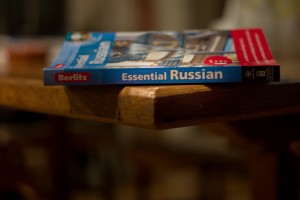 Getting ready for my trip, I thought I’d try and learn a few useful words. From Chapter 1 of my Teach Yourself Russian book, I can now say ‘coffee’ (although I don’t yet know how to say ‘I’d like a coffee please’, and being frightfully British that knowledge is essential). I can also say ‘son of Ivan’ (not sure that’s going to be very helpful, but hey, who knows?).
Getting ready for my trip, I thought I’d try and learn a few useful words. From Chapter 1 of my Teach Yourself Russian book, I can now say ‘coffee’ (although I don’t yet know how to say ‘I’d like a coffee please’, and being frightfully British that knowledge is essential). I can also say ‘son of Ivan’ (not sure that’s going to be very helpful, but hey, who knows?).
I’ve just started Chapter 2 and the first sentence we learn is: Я говорю no-pўсски. This translates as ‘I speak Russian’. Hmmm – a little premature to be saying this given that I can’t even pronounce the place I’m going to. I don’t think I’m going to master much of this before I go, but thankfully I have bi-lingual friends there! Only ten days to go …
I wonder if this a psychological ploy used in language books to boost the learner’s confidence. When I was learning German, one of the first sentences we learned translates as ‘I have successfully mastered this difficult language’. This was something of a leap from previous chapters, which involved sailors being upstairs with nephews, which is not as bad as it sounds! It has more to do with the words for sailor and nephew being part of a small group of nouns that decline in a peculiar way and to quote from the grammar book, they are mainly ‘male humans and animals’. Need I say more?
